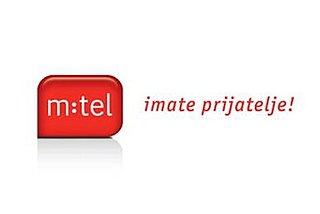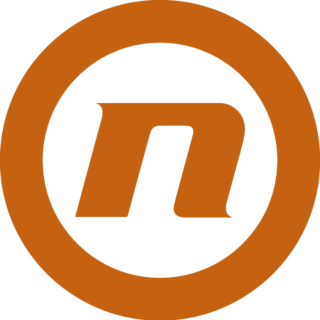
The economy of Bosnia and Herzegovina is a transitional, upper middle income economy. Bosnia and Herzegovina declared independence from socialist Yugoslavia on 1 March 1992. The main trading partners are Germany, Italy, Austria, Turkey and other neighboring Balkan countries.

Hrvatski Telekom d.d. is a Croatian telecommunications company. Since its initial public offering in October 2007, T-Hrvatski Telekom shares have traded on the Zagreb Stock Exchange, with global depositary receipts trading on the London Stock Exchange until 2014. As of 2016, Deutsche Telekom AG owned 51% of T-HT's shares, with the Raiffeisen Mandatory Pension Funds, Croatian War Veterans’ Fund and the Croatian government's Restructuring and Sale Center holding 8.9%, 6.7% and 2.9% respectively. The remaining free float was in the hands of private investors.

m:tel a.d. Banja Luka is a telecommunications company based in Banja Luka, Republika Srpska, Bosnia and Herzegovina. The company is owned by Telekom Srbija, and is the second largest telecommunications company in Bosnia and Herzegovina and the biggest one listed on the Banja Luka Stock Exchange, with the market capitalisation of about 540 million euros.

The country calling code of Bosnia and Herzegovina is +387.
Mirza Delibašić Cup, formerly Basketball Cup of Bosnia and Herzegovina, is the men's national basketball cup of Bosnia and Herzegovina. It is run by the Basketball Federation of Bosnia and Herzegovina and is named after Bosnian basketball legend and FIBA Hall of Fame member Mirza Delibašić.

The Central Bank of Bosnia and Herzegovina is the central bank of Bosnia and Herzegovina, located in the capital city, Sarajevo.
HT Eronet, doing business as JP Hrvatske telekomunikacije d.d. Mostar, is a telecommunications company in Bosnia and Herzegovina. The company was created on after separating Hrvatska pošta Mostar and Hrvatske telekomunikacije (HT).

The mass media of Bosnia and Herzegovina refers to mass media outlets based in Bosnia and Herzegovina (BiH). Television, radio, magazines and newspapers are all operated by both state-owned and for-profit corporations which depend on advertising, subscription, and other sales-related revenues. The Constitution of Bosnia and Herzegovina guarantees freedom of speech, although political and business pressures - coupled with administrative fragmentation - still hinder the independence of journalists and media outlets.

The relations between Bosnia and Herzegovina and Croatia were established on 7 July 1992, following both countries' declarations of independence from Yugoslavia during its breakup and Yugoslav Wars.
Television in Bosnia and Herzegovina was first introduced in 1961. Out of 94 TV stations, 71 are commercial, 20 are public, while 3 public services are funded through subscription.
Sarajevo is a major media centre in Bosnia and Herzegovina.

Nova BH is a Bosnian commercial television channel launched on 9 October 2018. From 2003 to 2018, this national commercial station formerly was known as Pink BH. Since October 2018, Nova BH is a member of the United Media portfolio, the leading media platform in South East Europe. Headquarters is located in Sarajevo and Nova BH also has offices and studios in Banja Luka.

The COVID-19 pandemic in Bosnia and Herzegovina was a part of the worldwide pandemic of coronavirus disease 2019 caused by severe acute respiratory syndrome coronavirus 2. The virus was confirmed to have reached Bosnia and Herzegovina on 5 March 2020, when a patient in Banja Luka, who had travelled to Italy, tested positive. Later on the same day, a second case, who was the son of the first case, was reported. On 21 March, the first death in the country from COVID-19 was announced in a hospital in Bihać. The patient was an elderly woman who had been hospitalized two days before.
Radio Zenica is a Bosnian local public radio station, broadcasting from Zenica, Bosnia and Herzegovina and it broadcasts a variety of programs such as news, music, morning and talk shows. Program is operated by RTV Zenica and it is mainly produced in Bosnian language.
Radio Glas Drine or RGD is a Bosnian group of commercial radio stations, broadcasting from Sapna, Bosnia and Herzegovina. It broadcasts a variety of programs such as news, music, morning and talk shows. A network of Radio Glas Drine radio stations is available in the Bosansko Podrinje and Bosnian-Podrinje Canton area, Semberija, Bosanska Posavina and Tuzla Canton area.
Federal News Agency or FENA is the government-owned national news agency of the Federation of Bosnia and Herzegovina.
Radio Kakanj is a Bosnian local commercial radio station, broadcasting from Kakanj, Bosnia and Herzegovina. This radio station broadcasts a variety of programs such music and local news.
Radio Breza is a Bosnian local commercial radio station, broadcasting from Breza, Bosnia and Herzegovina. This radio station broadcasts a variety of programs such as folk and pop music with local news.
The 2023–24 Basketball Championship of Bosnia and Herzegovina is 23rd season of this championship, with 13 teams from Bosnia and Herzegovina participating in it.











